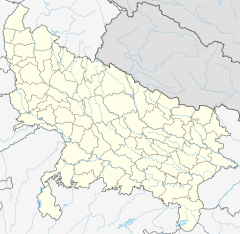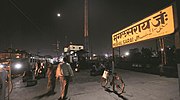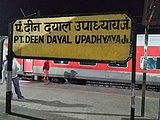Pandit Deen Dayal Upadhyaya Junction railway station
Pandit Deen Dayal Upadhyaya Junction | |||||||||
|---|---|---|---|---|---|---|---|---|---|
| Inter-city and regional rail station | |||||||||
 Pandit Deendayal Upadhyaya Junction station entrance | |||||||||
| General information | |||||||||
| Other names | Mughalsarai Junction | ||||||||
| Location | Mughalsarai 232101, Uttar Pradesh India | ||||||||
| Coordinates | 25°16′36″N 83°07′02″E / 25.2767°N 83.1173°E | ||||||||
| Elevation | 79.273 metres (260.08 ft) | ||||||||
| Owned by | Indian Railways | ||||||||
| Operated by | East Central Railways | ||||||||
| Line(s) | Howrah–Delhi main line, Howrah–Gaya–Delhi line, Howrah–Prayagraj–Mumbai line, Gaya–Pandit Deen Dayal Upadhyaya Junction section, Pandit Deen Dayal Upadhyaya Junction – Kanpur section, Grand Chord, Patna–Mughalsarai section, Pandit Deen Dayal Upadhyaya Junction–Varanasi–Lucknow section | ||||||||
| Platforms | 8 | ||||||||
| Tracks | 23 | ||||||||
| Connections | Auto stand, taxi stand | ||||||||
| Construction | |||||||||
| Structure type | Standard on ground | ||||||||
| Parking | Yes | ||||||||
| Bicycle facilities | Yes | ||||||||
| Other information | |||||||||
| Status | Functioning | ||||||||
| Station code | DDU (formerly MGS) | ||||||||
| Zone(s) | East Central Railway zone | ||||||||
| Division(s) | Pandit Deen Dayal Upadhyaya | ||||||||
| History | |||||||||
| Opened | 1862 | ||||||||
| Electrified | 1961–63 | ||||||||
| Passengers | |||||||||
| 3 lakh passengers per day | |||||||||
| |||||||||
Pandit Deen Dayal Upadhyaya Junction, formerly known as Mughalsarai Junction, (station code: DDU, old code MGS) is a railway station in the town of Mughalsarai in the Indian state of Uttar Pradesh.[1] The station contains the largest railway marshaling yard in Asia.[2] This yard caters to around 450–500 trains in a month.[3] All trains, including premium category Vande Bharat, Rajdhani and Duronto trains, halt at this station, which makes it unique in the entire Indian Railways network. "Major installations in Mughalsarai include electric locomotive shed holding 147 locomotives, diesel locomotive shed holding 53 locomotives, wagon ROH shed, and a 169-bed divisional hospital."[4]
History

The station was built by the East Indian Railway Company in 1862 as part of a plan to build a railway line connecting Delhi and Howrah.[5] Mughalsarai Junction was the second biggest railway station after Gaddar, near Karachi (in Pakistan now). Famously known as the gateway to east India, this junction was set up as part of a project to connect Delhi–Calcutta route by British railway company known as the East Indian Railways.[6]
The station is located on the Grand Trunk Road route. It was one of the busiest corridors during Mughal era which connected east India with the north. In 1862, the railway tracks crossed Mughalsarai and reached the western bank of the Yamuna.[7] The through link to Delhi was established in 1866.[8] The Grand Chord was commissioned in 1906.[9]
The Dufferin Bridge across the Ganges was opened in 1887, connecting Mughalsarai to Varanasi.[10]
The name of the station
On the evening of 10 February 1968, barely two months after he was elected president of the Bharatiya Jana Sangh, Deen Dayal Upadhyaya boarded the Sealdah Express from Lucknow to Patna. A few hours later, his body was found near a pole a few hundred feet from the end of a platform at Mughalsarai station. What followed was a long and involved investigation into what the Sangh and people insisted was a politically motivated murder by the ruling party. A CBI probe initiated by ruling party called it an accident; two men confessed to pushing him out of the train in a robbery attempt but were acquitted when it was found out to be made under duress; there was no sign of struggle or injury on Upadhyay's person. And conspiracy theories about power battles by Congress against the Sangh still abound. In 1992, then government of the state of Uttar Pradesh attempted to rename Mughalsarai after Deen Dayal Upadhyaya[11] However, the plan was shelved when Kalyan Singh, the chief minister was forced to resign after an outbreak of violence in the state following the Babri Masjid demolition.[12] In 2017, Government of India approved a fresh proposal forwarded by the Yogi Adityanath-led state government to rename the station.[13] The station was officially renamed as Pandit Deen Dayal Upadhyaya Junction on 4 June 2018.[12]

Electrification
The Gaya–Mughalsarai Junction section was electrified in 1961–63. Mughalsarai yard was electrified in 1963–65.[14]
Marshalling yard
Mughalsarai marshalling yard is the largest in Asia.[15][4][16] It is 12.5 km long and handles around 1,500 wagons daily. Wagon handling has come down after the railways discontinued piecemeal loading. At its peak, it handled 5,000 wagons a day. Of all divisions on Indian Railways, Mughalsarai Division deals the most intense train operations – both Goods and Coaching. It is the bridge between Eastern part and Northern part of India. It closes the distance between pit head coal and power house, finished steel product to user, food grain and fertiliser to eastern part of the country and other raw material to industries. The operational efficiency of the division plays a pivotal role in determining the efficiency of the East Central Railway and any setback or inefficiency in operations on this division is a sensitive matter which affects the overall operations of the Railways. Because of its crucial importance, the Railway Board keeps a special watch on Mughalsarai division's operations.[15][17]
Sheds and workshops
Mughal Sarai diesel loco shed is home to WDM-2, WDM-3A and WDS-5 diesel locos. The diesel shed also holds 50 electric locos, all of them WAG-7. There was a Northern Railway diesel loco shed at Mughalsarai. It was decommissioned in 2001. Mughalsarai electric loco shed can hold more than 150 electric locos. Amongst them are WAP-4 and more than 70 WAG-7 locos. The electric shed has recently started holding WAG-9 locomotives.[citation needed]
The largest wagon repair workshop of Indian Railways is located at Mughalsarai.[18]
Passenger movement
Pandit Deen Dayal Upadhyaya Junction is amongst the top hundred booking stations of Indian Railways.[19]
Electric Loco Shed, Pandit Deen Dayal Upadhyaya
| SN | Locomotives | HP | Quantity |
|---|---|---|---|
| 1. | WAP-4 | 5350 | 41 |
| 2. | WAG-7 | 5350 | 90 |
| 3. | WAG-9 | 6120 | 61 |
| Total Locomotives Active as of December 2024 | 192 | ||
Diesel Loco Shed, Pandit Deen Dayal Upadhyaya
| SN | Locomotives | HP | Quantity |
|---|---|---|---|
| 1. | WAG-7 | 5350 | 83 |
| 2. | WDG-3A | 3100 | 4 |
| Total Locomotives Active as of December 2024 | 87 | ||
Amenities
Pandit Deen Dayal Upadhyaya Junction railway station has 2 AC rooms, 4 non-AC retiring rooms, and a ten-bedded non-AC dormitory. It has a food plaza and a ‘Jan Aahar’ (affordable food) facility. The station has ATMs of nationalised banks.[20]
Gallery
- Platform 4 and 5 of Mughalsarai Junction from flyover
- A view of Mughalsarai Junction as seen from flyover.
- Inside Mughalsarai Junction station
- Platform 7 of Mughalsarai Junction.
- Mughalsarai Junction board.
- Board of showing the new name of the station: "Pt. Deen Dayal Upadhyaya Junction"
- Local Train on Platform 5 of Mughalsarai Junction.
- Food Track at Mughalsarai Junction platform 6
- Upper Class waiting room at Platform 6 of Mughalsarai Junction
See also
- Varanasi Junction railway station
- Varanasi City railway station
- Kashi railway station
- Banaras railway station
- Kerakat railway station
- Gaya Junction railway station
- Dhanbad Junction railway station
References
- ^ "After 156 years, Mughalsarai station renamed as Pandit Deen Dayal Upadhyaya Junction: Know all about it". India Today. 6 August 2018. Retrieved 17 June 2021.
- ^ "[IRFCA] Indian Railways FAQ: Freight Sheds and Marshalling Yards". IRFCA. Retrieved 7 January 2020.
- ^ Sood, Jyotika (17 October 2017). "Railways to invest Rs3,000 crore to mechanize, automate yards". Mint. Retrieved 1 February 2021.
- ^ a b "General Information" (PDF). East Central Railway. Archived from the original (PDF) on 25 May 2012. Retrieved 19 June 2013.
- ^ "Mughalsarai railway station renamed to Deen Dayal Upadhyay (DDU) station". The Indian Express. 14 October 2017.
- ^ "Why Mughalsarai station lost its name after 156 years. Uttar Pradesh's iconic railway station Mughalsarai Junction will be formally renamed after RSS ideologue Deen Dayal Upadhyaya". India Today. 6 August 2018.
- ^ Dikshit, Rajeev (5 August 2017). "Mughalsarai: The many names of Mughalsarai". The Times of India. Retrieved 1 February 2021.
- ^ "IR History: Early History (1832–1869)". IRFCA. Retrieved 19 June 2013.
- ^ "IR History: Part III (1900–1947)". IRFCA. Retrieved 19 June 2013.
- ^ "IR History: Part II (1870–1899)". IRFCA. Retrieved 19 June 2013.
- ^ Noorani, A.G. (2012). Islam, South Asia and the Cold War. Tulika Books. Retrieved 5 June 2018.
- ^ a b "Mughalsarai station is now Deen Dayal Upadhyay station". India Today. 5 August 2018. Retrieved 21 August 2018.
- ^ "Mughalsarai railway station renamed after Deen Dayal Upadhyaya: A look at stations that have been renamed recently". The Indian Express. 4 August 2017. Retrieved 21 August 2018.
- ^ "History of Electrification". IRFCA. Retrieved 19 June 2013.
- ^ a b "Freight Sheds and Mashalling Yards". IRFCA. Archived from the original on 27 January 2018. Retrieved 19 June 2013.
- ^ Barman, Arijit (8 January 2001). "Mughalsarai: Tracks to Nowhere". Outlook (Indian magazine). Archived from the original on 6 October 2013. Retrieved 19 June 2013.
- ^ "Marshalling Yards". Indian Railway Employee. Archived from the original on 13 November 2013. Retrieved 19 June 2013.
- ^ "Sheds and workshops". IRFCA. Retrieved 19 June 2013.
- ^ "Indian Railways Passenger Reservation Enquiry". Availability in trains for Top 100 Booking Stations of Indian Railways. IRFCA. Archived from the original on 10 May 2014. Retrieved 19 June 2013.
- ^ "Mughalsarai Division, Commercial Department" (PDF). Indian Railways. Retrieved 19 June 2013.
External links
![]() Media related to Pt. Deen Dayal Upadhyaya Junction railway station at Wikimedia Commons
Media related to Pt. Deen Dayal Upadhyaya Junction railway station at Wikimedia Commons
- Pandit Deen Dayal Upadhyaya Junction railway station at the India Rail Info
| Preceding station | Following station | |||
|---|---|---|---|---|
| Kuchman towards ? |
East Central Railway zone | Jeonathpur towards ? | ||
| Ganjkhwaja towards ? |
East Central Railway zone Grand Chord line |
|||
| Terminus | East Central Railway zone Mughalsarai–Varanasi–Lucknow line |
Vyasnagar towards ? | ||











